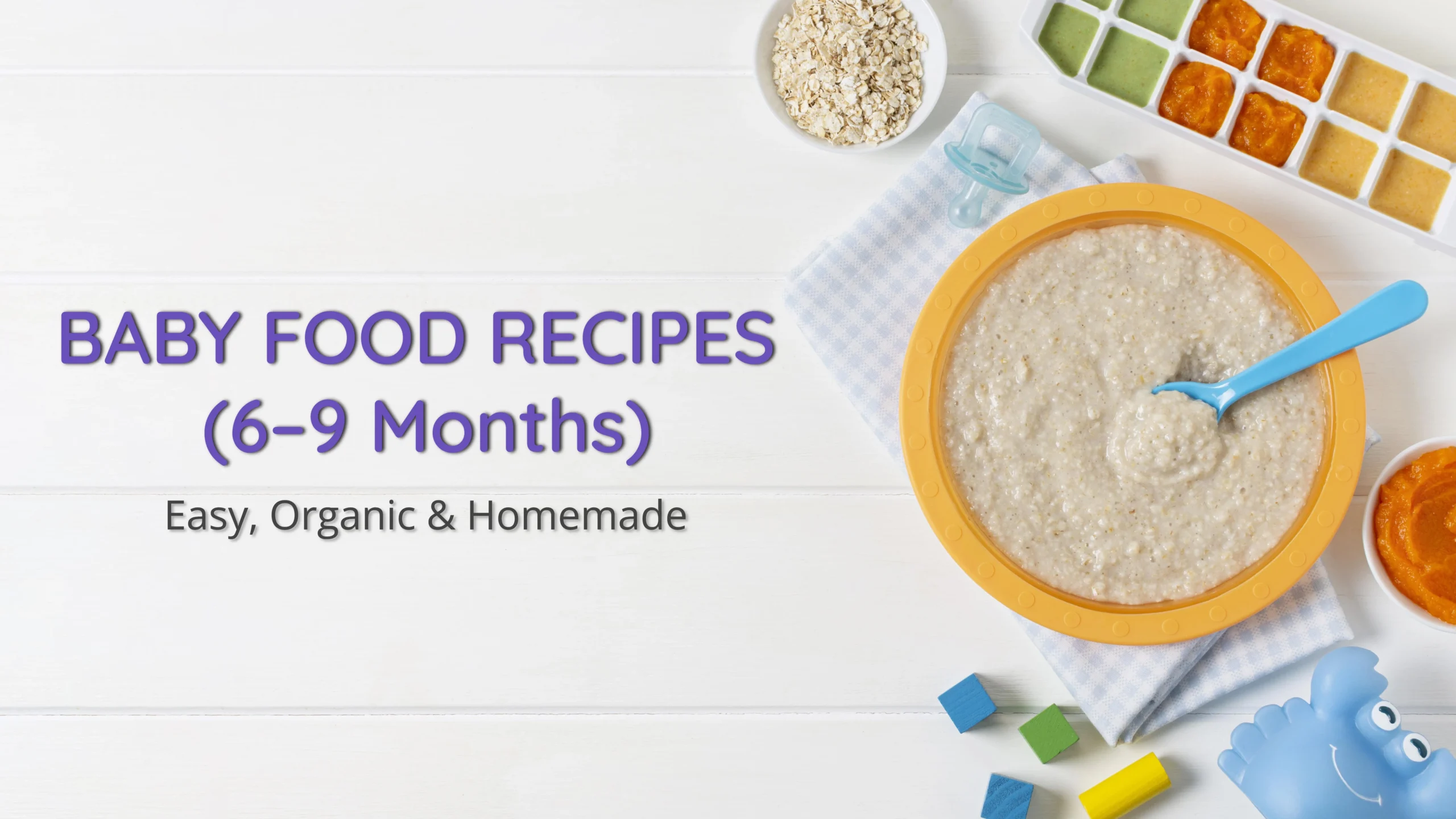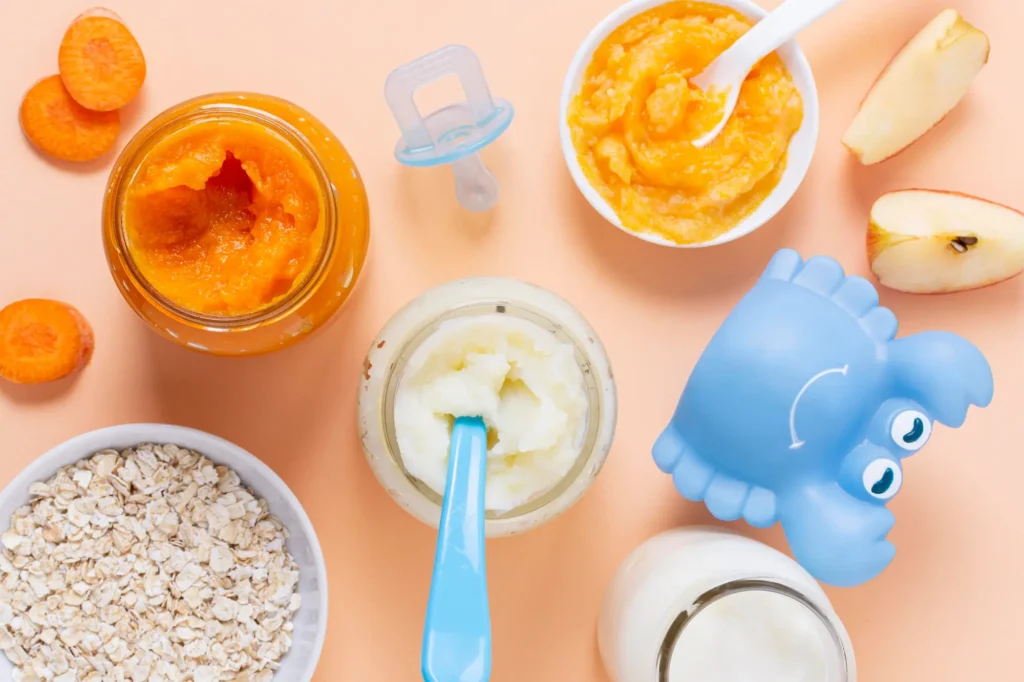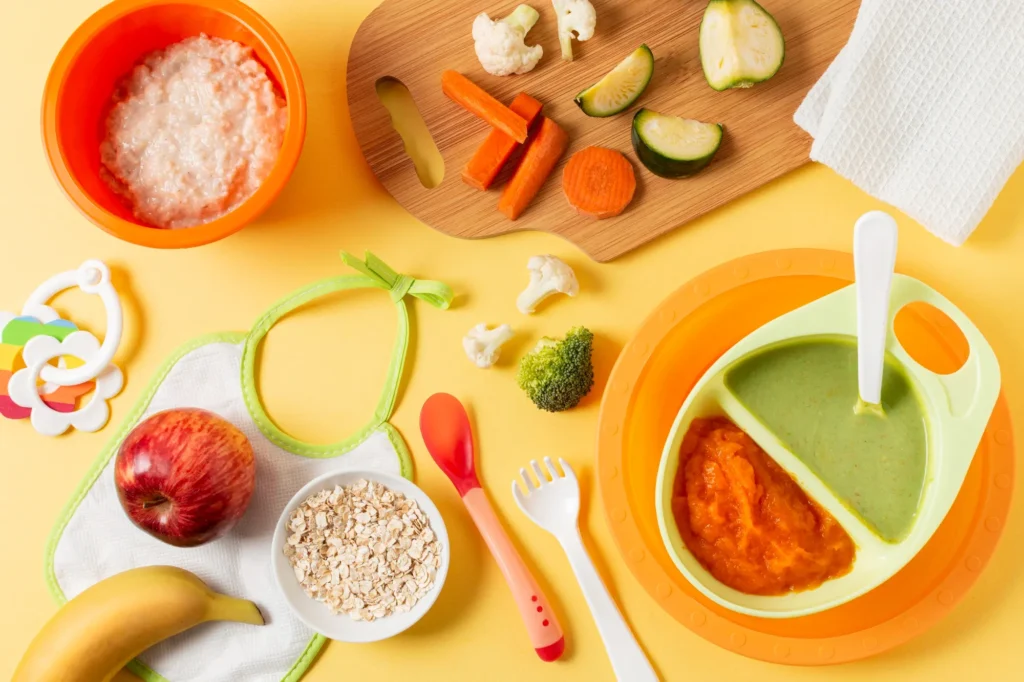Starting solids hits different. One minute it’s just bottles or nursing, and the next—bam—you’re in the puree aisle wondering what’s safe, what’s healthy, and what your baby might actually eat. It’s exciting, sure. But also kind of overwhelming. That’s exactly why I pulled these baby food recipes together for the 6–9 month stage. They’re not over-complicated. No weird blends. Just simple, organic, homemade combos that even the fussy ones tend to go for.
When and How to Introduce Baby Food (6–9 Months)
How do you even know your baby’s ready? Usually, it’s around 6 months—but it’s more about signs than age:
- Can sit up (with a little help).
- Holds their head steady.
- Starts grabbing at your plate.
If you’re seeing these clues, you’re good to go—but always double-check with your pediatrician. Start small, offering one new food at a time every few days. If your baby reacts, you’ll know exactly what caused it.
Why Choose Homemade Organic Baby Food?
Sure, jars from the store are convenient. But homemade organic purées give you something priceless—peace of mind.
When I started making baby food at home, it was about cutting out the stuff I couldn’t pronounce. No hidden sugars, no weird chemicals. Plus, I noticed something interesting: it often costs less, especially if you buy seasonal produce or stock up on frozen organic veggies.
Here’s something that made me pause: researchers tested hundreds of baby food jars from grocery shelves, and a surprising number of them—more than a quarter—had traces of pesticides. And not just one kind. Some had two, three, even more all in one little serving.
Reading that kind of stopped me in my tracks.
I wasn’t trying to be extreme, but if I could skip those chemicals just by grabbing the organic version of something my baby eats every day? That felt like the easier choice. Especially with apples, spinach, or grapes—the usual suspects on the Dirty Dozen list. The difference isn’t dramatic on paper, but when you’re feeding someone brand new to the world, it just hits different.
Some foods like apples, strawberries, and spinach often have higher pesticides (check the EWG Dirty Dozen list), so buying organic there just makes sense. [External link: Dirty Dozen list at EWG.org]
Essentials for Making Baby Food at Home
Good news: you don’t need fancy equipment. Here’s what works perfectly:
- Blender or food processor (nothing special, even a basic one is fine).
- Silicone ice cube trays (easy portions).
- Containers or jars for storing leftovers.
Keep things clean, wash your hands, and relax—you’ve got this.
Simple Organic Purees: First Foods (Stage 1 Recipes)
These recipes are foolproof starters. Your baby will be tasting new flavors in no time.
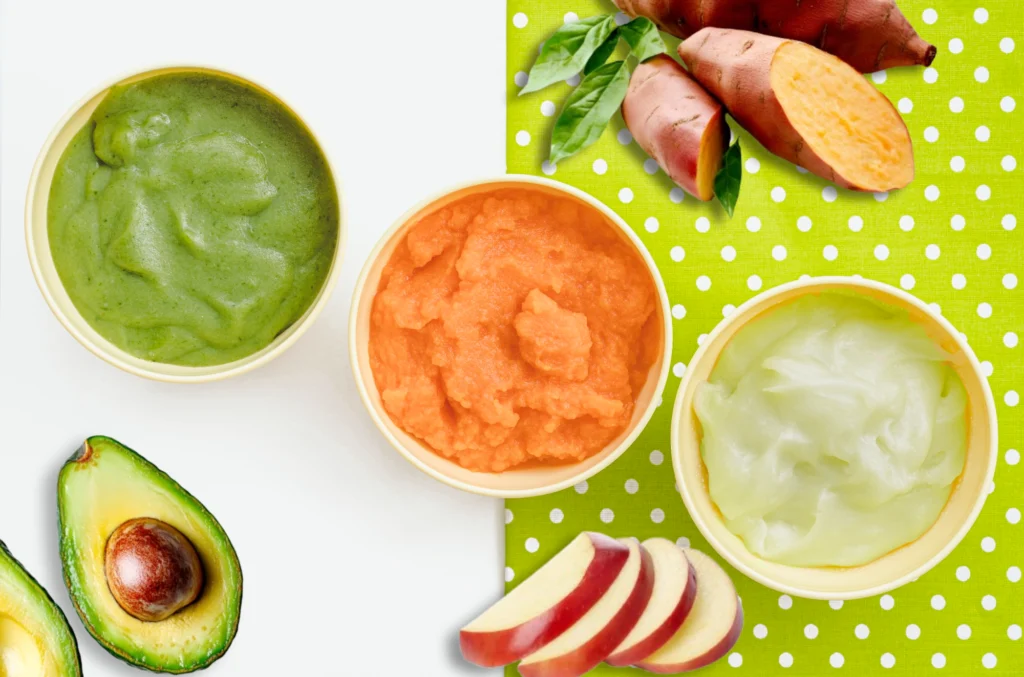
Organic Apple Puree
Organic apples are gentle and sweet, perfect for sensitive little bellies.
- Peel and chop two organic apples.
- Steam about 10 minutes until soft.
- Blend until smooth. Add water or breast milk as needed.
Freeze extras in ice cube trays. Easy!
Sweet Potato Puree
Babies love sweet potatoes. They’re creamy, sweet, and filled with vitamin A.
- Peel and dice one organic sweet potato.
- Steam or bake until very soft.
- Blend smooth, adding breast milk, formula, or water.
Freeze leftovers—trust me, you’ll appreciate having it ready to go.
Avocado and Banana Puree
No-cook recipe? Yes, please. Ideal for those “didn’t get enough sleep” days.
- Mash half an organic avocado with half an organic banana.
- Blend till creamy.
Serve fresh or freeze portions.
Moving to Combinations: Stage 2 Organic Recipes (7–9 Months)
When your baby gets a bit older, food recipes can be made more interesting by combining flavors.
Organic Carrot and Apple Blend
Sweet carrots plus apples—perfect pairing for little mouths.
- Steam one peeled organic carrot with one organic apple.
- Blend together smoothly.
Freeze extras to save your future self some trouble.
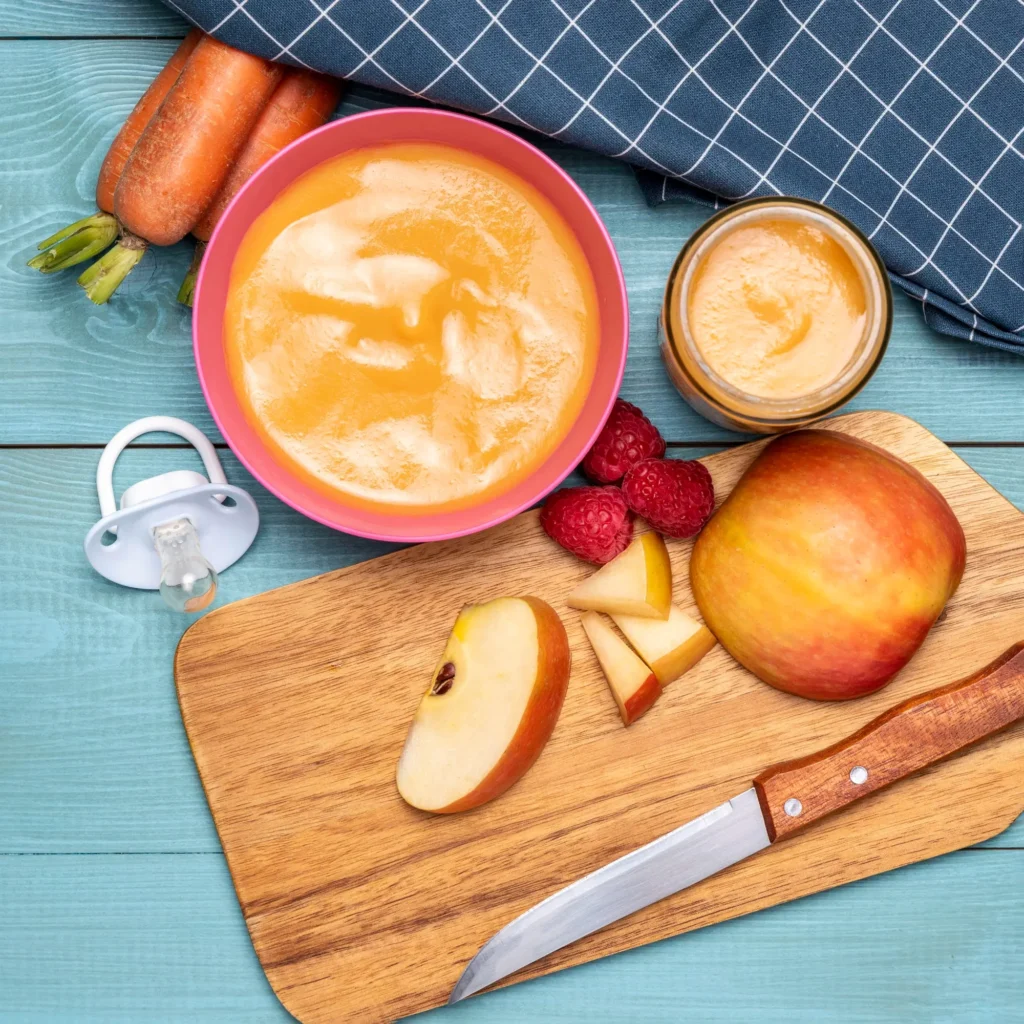
Spinach, Pea, and Pear Puree
Iron and flavor in one spoonful? That’s this puree.
- Steam organic spinach, peas, and peeled pears until tender.
- Blend until creamy and smooth.
Freezing in trays makes quick meal prep later.
Butternut Squash and Quinoa Puree
Quinoa adds protein—perfect as baby grows hungrier.
- Steam or roast organic butternut squash cubes until soft.
- Cook quinoa according to instructions.
- Blend together until smooth and creamy.
Tips to Make Baby Food Prep Easier and Faster
Making your own baby food recipes can feel overwhelming at first. Here’s how I keep it manageable:
- Batch Cook: Make bigger batches weekly. Freeze cubes for quick weekday meals.
- Thawing Trick: Pop cubes into the fridge overnight or quickly warm them in a bowl of hot water.
- Simple Combos: Combine easy foods you always have—like sweet potatoes and peas. Quick, nutritious, and stress-free.
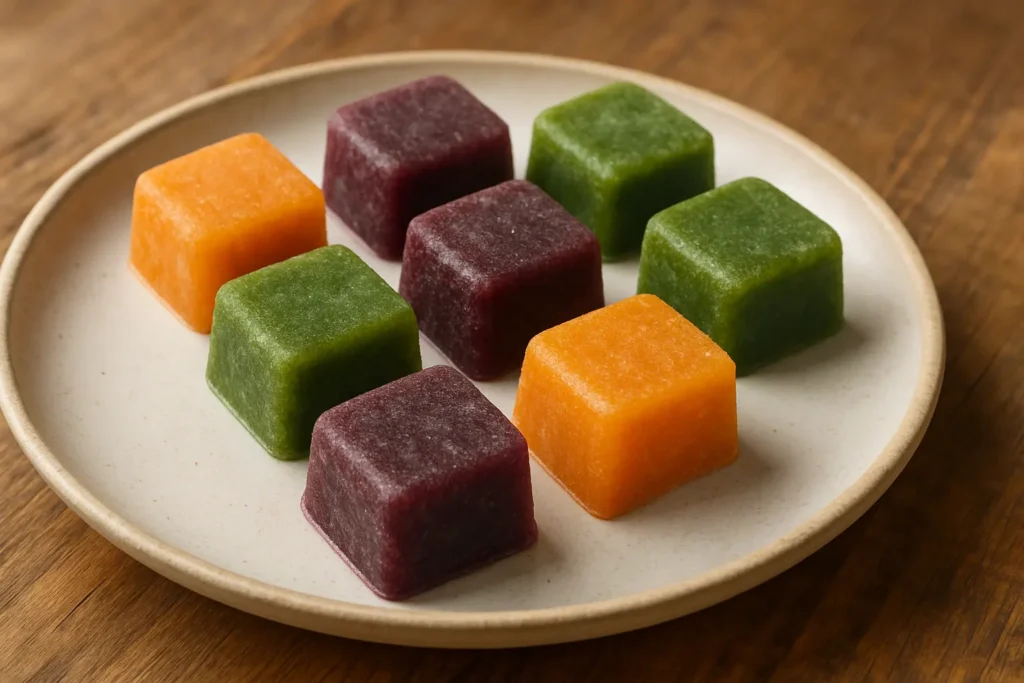
One of the reasons I stick with organic—even when batch-cooking—is because of what I read in this small dietary study. People who ate fully organic for less than a week showed a massive drop in the pesticide glyphosate in their system. Like, over 70%.
That stuck with me. If swapping out a few ingredients for organic can do that in grown-ups, imagine how that could affect a baby’s little body that’s still developing. Just felt like a no-brainer, especially for the foods I’m already prepping in bulk.
Common Questions Parents Ask About Homemade Baby Food
These came up often for me and my friends:
How long can homemade baby food last?
In the fridge? Two days tops. Freezer? About three months. (Label the dates—it saves guessing.)
Is organic necessary?
Organic matters for foods like apples or strawberries, since they’re higher in pesticides. If budget’s tight, stick to organic for the Dirty Dozen and buy conventional Clean 15.
What if my baby rejects new foods?
Totally normal! My son rejected sweet potatoes—8 tries later, she loved them. Keep offering patiently; they’ll get there.
Foods to Avoid for Babies Under 9 Months
Here’s what’s best to skip until later:
- Honey (not safe under age one).
- Added sugar or salt (babies don’t need these yet).
- Whole nuts, grapes, raw veggies—choking hazards.
- Cow’s milk (tough digestion at this age).
Final Thoughts on Organic Baby Food Recipes at Home
Cooking baby food might feel like a chore at first, but it quickly becomes second nature. It’s less about perfection, more about choosing cleaner, better ingredients whenever possible. Each spoonful matters, and you’re doing a great job making food your baby loves.
Helpful resources to keep you going:

